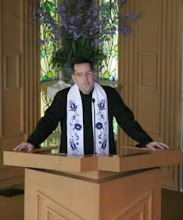My first Interview
An imagined conversation where someone is asking me
some questions about the nature of my faith.
What does it mean for you to say “I am a person of faith?”
First and foremost, it means to me that we can know, as the Psalmist says, ‘the goodness of the holy in the land of the living.’ It means that I recognize that the world does not revolve around me. It means that I, in my coming and going, attempt to live a life of integrity and goodness, while recognizing that I need to both receive and give a sense of grace and strive for reconciliation. I am a person of faith, because I believe, with a sense of urgency, that we are all brothers and sisters and that we are somehow connected one to another and to all creation.
What is the nature of your faith? Upon what does it depend?
I believe in a God whose primary characteristics, based on my experiences and learnings, are compassion and creativity. With Paul Tillich, I affirm that God is ‘being-itself.’ With Henry Nelson Wieman, I say that God is ‘creative event’ and ‘goodness.’ My faith rests upon the idea that at the heart of all creation there is a goodness. That goodness is definitive. God is this process which works through and in nature and humanity. In order to receive God, or experience God, one must experience the creative interchange that is possible between and among humans and all of creation. I hope that my thinking and believing is always open to growth and development and reconsideration. I attempt to live my life in this way. Having said that, I cannot imagine a faith that is not somehow dependent upon this kind of creative interchange. Even when I thwart or obstruct the goodness at the heart of all creation, which I have done more often than I would like, I still stand in awe of the possibility of moving toward the good in every situation, I still stand in awe of the possibility of reconciliation and wholeness.
You call yourself a UU Christian. You serve on the UUCF national board. Why?
I believe that Jesus points the way to this God of creativity and love in ways that surpass other prophets and teachers. I believe that the humanity of Jesus, his teachings and his life, are worth lifting up as a strong guide to the idea of coming to faith. When I see that Jesus is corrupted by political agendas that devalue life and the earth, I feel compelled to lift up the vision of Jesus who a) never asked someone who needed help anything about their theological beliefs, b) stood against empire and domination and oppression while maintaining a strong stance of non-violent witness; c) who stood against the moral guardians of the law in favor of a common sense approach to lifting up humanity and d) who still to this day provides in his teachings and his life the way of compassion and love.
Are there other influences on your faith?
So many: the powerful teachings of Thich Nhat Hanh and Howard Thurman. The liberationist theologians of South America, especially Oscar Romero and Leonardo Boff. Father John Dear and the Berrigans. The religious humanists like Nancy Haley in Iowa City, Mark Stringer in Des Moines, Brian Eslinger in Ames, Fred Muir in Annapolis and Bill Murry formerly of Meadville Lombard Theological School. Jazz, especially Theolonius Monk. Annie Dillard. Mary Oliver. A perfect sunrise. The ocean. The mountains. The prairie.
Now, that I’ve said my piece. What do you say?
Roger
Labels: faith, liberal christian, unitarian universalism

